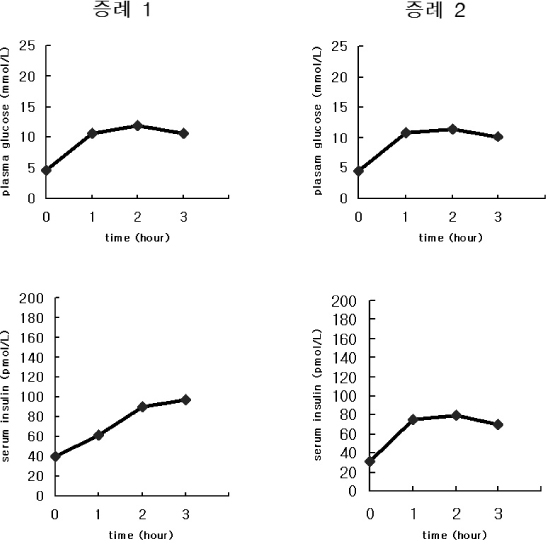J Korean Diabetes Assoc.
2006 Sep;30(5):398-402. 10.4093/jkda.2006.30.5.398.
Clinical Courses of Two Women with Gestational Diabetes Mellitus Who are GAD Antibody Positive
- Affiliations
-
- 1Department of Medicine, Cheil General Hospital, Sungkyunkwan University of School of Medicine, Korea.
- 2Department of Endocrinology and Metabolism, School of Medicine, Kyung Hee University, Korea.
- KMID: 2008270
- DOI: http://doi.org/10.4093/jkda.2006.30.5.398
Abstract
- Gestational diabetes mellitus (GDM) is defined as glucose intolerance of various degrees with onset or first recognition during pregnancy. Women with GDM are at high risk of developing type 2 diabetes later in life, but the risk of developing type 1 diabetes is also increased. Positivity for glutamic acid decarboxylase (GAD) antibodies during pregnancy confers a high risk for subsequent progression to type 1 diabetes. Here, we reported the two cases with GDM who were GAD antibody positive and progressed to type 1 diabetes with different time-courses. One woman with GDM progressed rapidly to classical type 1 diabetes while the other became slowly progressive IDDM (SPIDDM) [or latent autoimmune diabetes in adults (LADA)].
MeSH Terms
Figure
Reference
-
1. Expert Committee on the Diagnosis and Classification of Diabetes Mellitus. Report of the expert committee on the diagnosis and classification of diabetes mellitus. Diabetes Care. 2003. 26:S5–S20.2. American Diabetes Association. Gestational diabetes mellitus (Position Statement). Diabetes Care. 2004. 27:S88–S90.3. Metzger BE, Coustan DR. Organizing Committee. Summary and recommendations of the Fourth International Workshop-Conference on Gestational Diabetes Mellitus. Diabetes Care. 1998. 21:B161–B167.4. American College of Obstetrics and Gynecologists Committee on Practice Bulletins-Obstetrics. Gestational diabetes. Obstet Gynecol. 2001. 98:525–538.5. Kim C, Newton KM, Knopp RH. Gestational diabetes and the incidence of type 2 diabetes. Diabetes Care. 2002. 25:1862–1868.6. Cheung NW, Byth K. Population health significance of gestational diabetes. Diabetes Care. 2003. 26:2005–2009.7. Fuchtenbusch M, Ferber K, Standl E, Ziegler AG. Prediction of type 1 diabetes postpartum in patients with gestational diabetes mellitus by combined islet cell autoantibody screening: a prospective multicenter study. Diabetes. 1997. 46:1459–1467.8. Vaughan JE, Raochod HA. Incidence of gestational diabetes at northen hospital. Diabetes. 1991. 40:414.10. Jang HC, Cho NH, Jung KB, Oh KS, Dooley SL, Metzger BE. Screening for gestational diabetes mellitus in Korea. Int J gynecol Obstet. 1995. 51:115–122.11. Buchanan TA. Pancreatic β-cell defects in gestational diabetes: Implications for the pathogenesis and prevention of type 2 diabetes. J Clin Endocrinol Metab. 2001. 86:989–993.12. Palmer JP. What is the best way to predict IDDM? Lancet. 1994. 343:1377–1378.13. Petersen JS, Dyrberg T, Damm P, Kuhl C, Molsted-Pedersen L, Buschard K. GAD65 autoantibodies in women with gestational or insulin dependent diabetes mellitus diagnosed during pregnancy. Diabetologia. 1996. 39:1329–1333.14. Tuomilehto J, Zimmet P, Mackay IR, Koskela P, Vidgren G, Toivanen L, Tuomilehto-Wolf E, Kohtamaki K, Stengard J, Rowley MJ. Antibodies to glutamic acid decarboxylase as predictors of insulin-dependent diabetes mellitus before clinical onset of disease. Lancet. 2001. 343:1383–1385.15. Dozio N, Beretta A, Belloni C, Castiglioni M, Rosa S, Bosi E, Bonifacio E. Low prevalence of islet autoantibodies in patients with gestational diabetes mellitus. Diabetes Care. 1997. 20:81–83.16. Huh KB, Lee HC, Kim HM, Cho YW, Kim YL, Lee KW, Lee EJ, Lim SK, Kim DH, Yoon JW. Immunogenetic and nutritional profile in insulin-using youth-onset diabetics in Korea. Diabetes Res Clin Pract. 1992. 16:63–70.17. Ahn CW, Kim HS, Nam JH, Song YD, Lim SK, Kim KR, Lee HC, Huh KB. Clinical characteristics, GAD antibody (GADA) and change of C-peptide in Korean young age of onset diabetic patients. Diabet Med. 2002. 19:227–233.18. Chuang LM, Tsai ST, Huang BY, Tai TY. Diabcare-Asia 1998 Study Group. The status of diabetes control in Asia--a cross-sectional survey of 24317 patients with diabetes mellitus in 1998. Diabet Med. 2002. 19:978–985.19. Stenstrom G, Gottsater A, Bakhtadze E, Berger B, Sundkvist G. Latent autoimmune diabetes in adults: definition, prevalence, beta-cell function, and treatment. Diabetes. 2005. 54:Suppl. 2. S68–S72.
- Full Text Links
- Actions
-
Cited
- CITED
-
- Close
- Share
- Similar articles
-
- Chronic Complications in Adult Diabetic Patients with and without GAD Antibody
- Measurement of GAD Antibody in Korean with Diabetes Mellitus
- Nutrition Care in Gestational Diabetes Mellitus
- The Frequency of ICA and anti-GAD Antibody in Korean IDDM and NIDDM Patients
- Frequency of Anti-GAD Antibody in Non-obese, Adult-onset Type 2 Diabetes in Korea and Clinical and Biological Characteristics According to Anti-GAD Antibody



